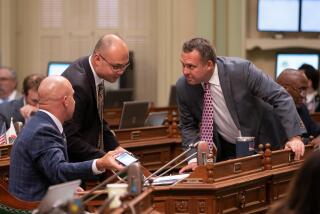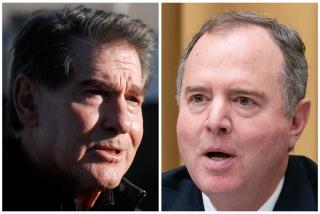Presto! Hart Has a Computer : Creative Financing Pushes Campaigns to Edge of Law
- Share via
WASHINGTON — In the desperate early days of September, 1983, Gary Hart needed a computer system for his fledgling presidential campaign. But he had no money to buy it, and campaign laws forbade any wealthy donor from simply giving him such a gift.
So a bearded environmental lawyer named Dave and a journalist friend named Ken, both ardent Hart supporters and campaign volunteers, paid $64 to incorporate themselves as a District of Columbia corporation, Intelligent Resources Inc. Then they got a contract from Hart to sell the campaign a computer system on the installment plan, used the contract and a little up-front cash from the campaign to get a loan from a local bank and bought roughly $36,000 worth of electronics gear.
Presto-change-o! Hart had his computers at a good price and easy terms from a friendly supplier for whom getting paid was not the only consideration.
Viewed from one perspective, this piece of financial legerdemain looks like a scheme to let two individuals and a shell corporation make a campaign contribution that evades the spirit of federal election laws. Viewed another way, it was just free enterprise: after all, individuals and companies regularly take credit risks for what they hope will become valuable customers.
But no matter how it is viewed in terms of the law, the saga of one CompuPro 816/C with 40 megabyte hard disc, five terminals, an NEC spinwriter, modem and software illustrates a pervasive truth about all political campaigns, Hart’s and those of his rivals: Federal election laws are full of loopholes, and under the pressure of political realities, campaigns scramble to find ways to get the money they feel they need to carry on.
Hart’s aides may have been more aggressive than some in other campaigns--they felt they had to be, because they had less money and less organization than some. But if the campaign operated by standards that were no higher than others, they were also probably no lower, officials of other campaigns say.
Deals like the computer arrangement “had become the new wave in how to punch holes in the campaign finance laws,” says Dave Masselli, who set up the deal with his partner, Ken Maize. Masselli is now retired from politics and practicing law in Virginia, and Maize is an editor for an environmental magazine.
“If I’m a candidate and you lend me $1,001, we both violate the law,” which limits individual contributions to $1,000 and prohibits corporate gifts entirely. “But if you happen to be in the printing business or the charter flight business or the computer business, you can bill me on 30-days’ credit or 60-days’ credit,” which is “equivalent to enormous sums of money.”
Seen as Gray Area
If the federal election system were governed by a large, aggressive regulatory agency like the Internal Revenue Service or the Securities and Exchange Commission, such schemes might be held illegal. But under the not-so-watchful-and-stringent eye of the undermanned Federal Election Commission, they exist in a legal landscape painted gray.
The election regulations require that extensions of credit be “reasonable” and related to a company’s “normal course of business.” The standards are poorly defined, the FEC has so large a backlog that it never investigates until long after a campaign is over; even when violations are found, the penalties the FEC can levy are low.
Thus for political operatives, the risk of stretching the law is nothing in comparison to the risk of losing an election. And so long as a candidate is successful, games like the one played to get Hart a computer work tolerably well; money comes in, and the bills get paid.
Like a child’s game of musical chairs, however, when the music stops, someone gets stuck.
Masselli and Maize were lucky. They got in early, when Hart was still on the upswing, and the computer was paid for. Others did not fare so well.
Over the nine months, as Hart has entered, left and re-entered the Democratic presidential race, the finances of his 1984 campaign repeatedly have come back to stick him. The specter returned this last week with reports that an Orange County video producer and Hart supporter, Stuart Karl, had spent about $15,000 to provide goods and services Hart needed for the 1984 Democratic National Convention and had put a Hart aide on his payroll in 1986 and the first few weeks of 1987.
A few of the reports have alleged clear violations of campaign laws. Friday, for example, Hart campaign manager Sue Casey said Karl may have made two contributions in excess of the $1,000 limit by having two employees send checks and then reimbursing them. The money would be returned, Hart said.
But those clear improprieties are relatively small--a few thousand dollars in campaigns that raised and spent tens of millions. The more common pattern is arrangements that may evade the spirit of the law but probably comply with its letter. The computer deal was one such arrangement. So was another deal, reported last spring by The Times, in which a media company owned by a prominent Hart supporter in Virginia advanced $900,000 in credit to buy advertising time for Hart.
The goal, former campaign aides said, was to find credit and thereby stretch the campaign’s cash as far as it could go. In the early stages of the campaign, those strategies worked. Hart won primaries, his contributions ballooned from $125,000 in January, 1984, to $3 million in March, and those who had extended credit to the campaign got repaid.
Music Stopped
But then the music stopped. Hart started to lose and contributions fell off. In a frantic--and nearly successful--attempt to win late primaries and turn the struggle around, Hart kept spending, and he finished deep in debt. The Virginia media company, for example, ended up being owed $400,000.
Hart was not alone in pushing the limits.
Walter F. Mondale, for example, went into the 1984 Democratic Convention $3.5 million in debt, according to his former campaign treasurer, Michael Berman. “If Walter Mondale had known . . . well, I didn’t tell him, I just had enough faith that we would win. But, if he hadn’t won, I would have killed myself by now,” Berman said.
In another month, Berman predicts, the current candidates will “be pushing the edges” of the law as they, too, run short of cash. Those who drop out early will not rack up large debts. The person who wins the nomination, like Mondale in 1984, will be able to pay his debts.
But those who stay in for the long haul will be looking to replicate the money stretching strategies of 1984. Some of those strategies are no longer available.
In the spring of 1984, for example, Karl bought the Hart campaign’s office furniture, then leased it back to the campaign. Today, FEC regulations strictly limit lease-backs. The FEC is currently investigating Republican hopeful Pat Robertson’s campaign for violating those rules in leasing computers.
At the time, however, election experts agree that the rules allowed such deals so long as they were “reasonable.” And one such deal is the end of the computer’s tale. In February, 1984, once Intelligent Resources had been repaid, the Hart campaign sold the equipment for $20,000 to Orange County developer David Stein, a Hart supporter, who then leased it back to Hart for three years at $710.33 a month.
Hart paid Stein in March, April and May, according to Stein’s assistant Christopher Townsend, but in June the campaign ran out of money. In July, Hart’s aides brought the computer out to San Francisco for the Democratic National Convention, and as soon as the convention--and the campaign--was safely over, Stein repossesed it.
At the end of the year, Stein sold the machine for $6,000 to the Center for Auto Safety, a Washington-based consumer group associated with Ralph Nader. Staff members there still sometimes refer to it as “the Gary Hart computer.”
More to Read
Get the L.A. Times Politics newsletter
Deeply reported insights into legislation, politics and policy from Sacramento, Washington and beyond. In your inbox twice per week.
You may occasionally receive promotional content from the Los Angeles Times.










